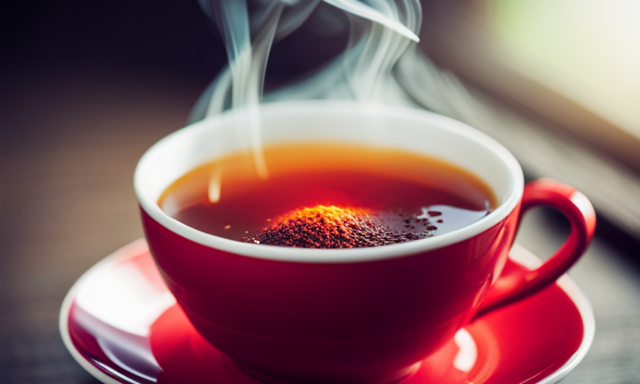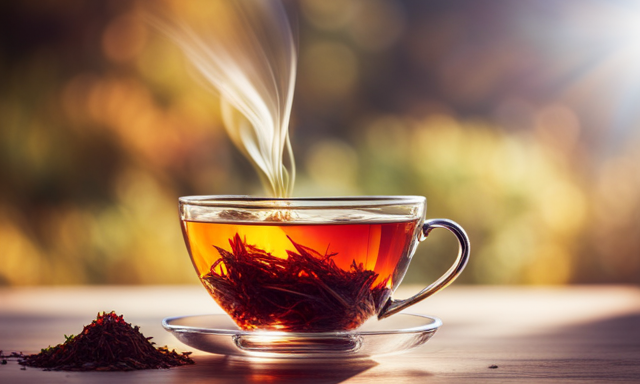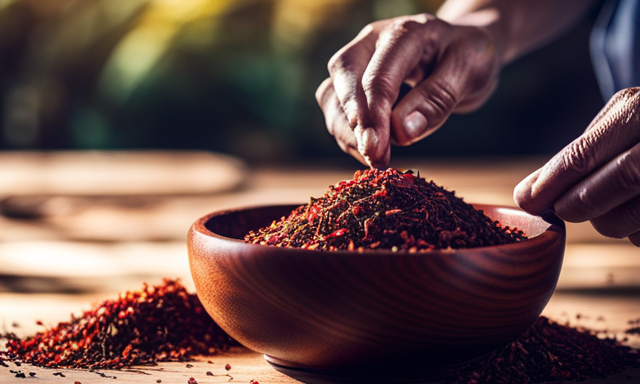Imagine a warm, soothing hug in a cup – that’s what a steaming mug of African Red Bush, or Rooibos tea, feels like to me. As a tea enthusiast, I’ve always been intrigued by the caffeine content in different brews. So, when it comes to Rooibos, a naturally caffeine-free herbal tea, I have often wondered how it stacks up against other popular options.
In this article, we’ll dive into the origins and cultivation of Rooibos tea, exploring its unique caffeine-free nature. We’ll also compare Rooibos to other herbal teas, discussing its health benefits and delightful flavor profile. Additionally, we’ll discover how to brew the perfect cup of Rooibos tea and recommend some top-notch brands and blends.
So, if you’re curious about the caffeine content in African Red Bush tea and want to unravel the secrets of this beloved brew, join me on this caffeine-free journey. Let’s explore the world of Rooibos together!
Key Takeaways
- African Red Bush tea, also known as Rooibos tea, is a caffeine-free herbal tea derived from the Aspalathus linearis plant.
- Rooibos tea is exclusively grown in the Cederberg region of South Africa and is harvested by hand to ensure high quality.
- Rooibos tea is rich in antioxidants, such as aspalathin and nothofagin, which offer protection against oxidative stress and inflammation.
- Rooibos tea has a unique flavor profile with natural sweetness and earthy undertones, making it a versatile ingredient in recipes and a popular choice for its caffeine-free nature, health benefits, and delightful taste.
The Origins and Cultivation of Rooibos
If you’re curious about the origins and cultivation of rooibos, you’ll be fascinated to learn that this unique herbal tea is exclusively grown in the Cederberg region of South Africa.
The origins of rooibos can be traced back centuries ago when indigenous Khoisan people discovered the plant and started using it for its medicinal properties.
Today, rooibos is cultivated on farms in the Cederberg area, where it requires a delicate balance of sandy soil, hot summers, and cold winters to thrive.
The plants are carefully tended to and harvested by hand to ensure the highest quality.
Understanding the caffeine-free nature of rooibos is essential in appreciating its appeal as a soothing and refreshing beverage.
Understanding the Caffeine-Free Nature of Rooibos
Although some may argue that certain types of tea contain caffeine, it’s important to note that rooibos, also known as African red bush, is completely caffeine-free. Unlike traditional tea made from Camellia sinensis, rooibos is derived from the Aspalathus linearis plant, which doesn’t contain any caffeine.
This makes rooibos a popular choice for those looking to avoid the stimulating effects of caffeine while still enjoying a hot beverage. Despite being caffeine-free, rooibos offers a range of health benefits. It’s rich in antioxidants, such as aspalathin and nothofagin, which help protect the body against oxidative stress and inflammation.
Rooibos has also been linked to improved heart health, reduced blood pressure, and enhanced digestion. Comparing rooibos to other caffeine-free herbal teas, it’s clear that rooibos stands out for its unique flavor profile and numerous health benefits.
Comparing Rooibos to Other Caffeine-Free Herbal Teas
When it comes to choosing a caffeine-free herbal tea, nothing compares to the unique flavor and countless health benefits of rooibos. Not only does rooibos provide a satisfying and robust taste, but it also offers a variety of advantages that set it apart from other herbal teas.
Firstly, let’s compare rooibos to chamomile. While chamomile is widely known for its calming properties, rooibos takes it one step further with its rich antioxidant content. These antioxidants not only promote overall well-being but also have specific benefits for the skin, such as reducing inflammation and improving complexion.
In addition to its skin benefits, rooibos is also packed with essential minerals like calcium, magnesium, and potassium, making it a great choice for maintaining healthy bones and supporting cardiovascular health.
Transitioning into the next section about the health benefits of rooibos tea, it’s important to note that these advantages extend far beyond just the skin.
Health Benefits of Rooibos Tea
Let’s explore the numerous health benefits that come with enjoying a cup of this remarkable herbal tea, known as rooibos.
Rooibos tea is known for its rich antioxidant content, making it a popular choice for those seeking to boost their overall health. Antioxidants help protect our cells from damage caused by free radicals, which can lead to various diseases and aging.
In addition to antioxidants, rooibos tea also contains several other beneficial compounds, including polyphenols and flavonoids, which have been linked to reducing inflammation, improving heart health, and even potentially lowering the risk of certain types of cancer.
Drinking rooibos tea regularly may also help support a healthy immune system and promote good digestion. With all these health benefits, it’s no wonder that rooibos tea is gaining popularity among tea enthusiasts.
Now, let’s delve into the flavor profile of rooibos tea.
Exploring the Flavor Profile of Rooibos
If you’re a tea lover, you’ll be delighted to know that rooibos tea offers a unique and pleasant flavor profile that is enjoyed by millions around the world. Exploring rooibos flavor combinations can be an exciting journey.
With its natural sweetness and earthy undertones, rooibos pairs well with a variety of ingredients. Many people enjoy adding a hint of citrus or a touch of honey to enhance its flavor.
In South Africa, rooibos holds great cultural significance. It’s been a beloved beverage for centuries and is often used in traditional ceremonies and social gatherings. The rich history and cultural importance of rooibos add to its allure.
Moreover, rooibos is a versatile ingredient in recipes that opens up a world of culinary possibilities. From desserts to savory dishes, rooibos can lend its unique flavor to create delicious and innovative recipes.
Transitioning into the next section, let’s explore how rooibos can elevate your cooking experience.
Rooibos as a Versatile Ingredient in Recipes
Expand your culinary horizons and discover the endless possibilities of incorporating rooibos into your recipes for an unparalleled flavor experience.
Rooibos, with its unique taste and versatility, can elevate your cocktails and desserts to new heights. Here are three ways to experiment with rooibos in your kitchen:
-
Infused Syrups: Create a rooibos-infused simple syrup by steeping the tea in hot water and mixing it with sugar. This flavorful syrup can be used to sweeten cocktails like rooibos margaritas or add a twist to classic desserts like rooibos-infused crème brûlée.
-
Rooibos Granita: Freeze brewed rooibos tea with a touch of sugar and lemon juice to make a refreshing granita. Serve it as a palate cleanser between courses or as a light and tangy dessert.
-
Rooibos Panna Cotta: Replace traditional milk or cream with brewed rooibos tea to make a creamy and fragrant panna cotta. Top it with fresh berries or a drizzle of honey for a delightful dessert.
Now, let’s move on to learning how to brew the perfect cup of rooibos tea.
How to Brew the Perfect Cup of Rooibos Tea
To create a truly exquisite cup of rooibos tea, steep the fragrant leaves in freshly boiled water for 5-7 minutes, allowing the rich flavors to infuse and transport you to a world of warmth and comfort.
Rooibos tea is known for its versatility and can be enjoyed hot or cold. When brewing rooibos tea, it’s important to use water that’s just come to a boil, as this’ll ensure proper extraction of the tea’s flavors.
Steeping times can vary depending on personal preference, but 5-7 minutes is generally recommended for a full-bodied cup of rooibos tea. Longer steeping times can result in a stronger, more pronounced flavor.
Now, let’s explore some recommendations for rooibos tea brands and blends.
Recommendations for Rooibos Tea Brands and Blends
When it comes to choosing the perfect rooibos tea brand or blend, you can’t go wrong with the vibrant and flavorful options offered by Teavana or Tazo. These brands have gained popularity for their high-quality rooibos tea blends that satisfy even the most discerning tea enthusiasts. Here are some of the best rooibos blends available on the market:
-
Teavana Joyful Garden Rooibos Tea: A delightful blend of rooibos, marigold petals, and sweet tropical fruits.
-
Tazo Organic Rooibos Tea: This blend combines the earthy notes of rooibos with a touch of vanilla for a smooth and comforting cup of tea.
-
Numi Organic Rooibos Tea: Known for its rich and full-bodied flavor, this blend is perfect for those looking for a robust rooibos experience.
-
Republic of Tea Organic Rooibos Tea: With a hint of vanilla and honey, this blend offers a subtly sweet and fragrant taste.
-
Mighty Leaf African Nectar Rooibos Tea: A refreshing blend of rooibos, hibiscus, and exotic fruits that transports you to the heart of Africa.
These rooibos tea brands and blends are sure to impress any tea lover with their exceptional quality and taste.
Frequently Asked Questions
Does rooibos tea contain any caffeine?
Rooibos tea does not contain any caffeine. Unlike other types of tea, it is naturally caffeine-free. This makes it a great option for those looking to avoid the stimulating effects of caffeine on the body.
Can rooibos tea be consumed by individuals who are sensitive to caffeine?
Yes, rooibos tea can be consumed by individuals who are sensitive to caffeine. It is naturally caffeine-free and has numerous benefits for sensitive individuals, such as promoting relaxation and improving sleep quality.
What are some other caffeine-free herbal teas that can be compared to rooibos tea?
When it comes to caffeine-free herbal teas, chamomile and rooibos are often compared. While chamomile is known for its calming properties, rooibos offers a range of health benefits. Additionally, peppermint tea is praised for its digestive benefits.
Are there any potential health benefits associated with drinking rooibos tea?
There are potential health benefits associated with drinking rooibos tea. Research suggests that it may help with chronic diseases like heart disease and diabetes due to its antioxidant and anti-inflammatory properties.
What are some recommended brands and blends of rooibos tea available in the market?
I recommend trying brands like Numi, Yogi, and Republic of Tea for a quality selection of rooibos tea. These brands offer various blends that are known for their health benefits, such as antioxidants and potential anti-inflammatory properties.
Conclusion
In conclusion, it’s quite fascinating to discover that African red bush, or rooibos, isn’t only caffeine-free but also offers a range of health benefits. Despite its lack of caffeine, it still manages to provide a flavorful and versatile tea experience. Who would’ve thought that a tea without caffeine could be so popular and beloved? So next time you’re looking for a caffeine-free option, don’t overlook the irony of choosing rooibos tea, a truly unique and delightful choice.










